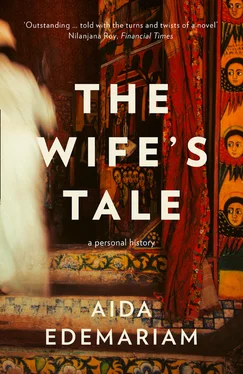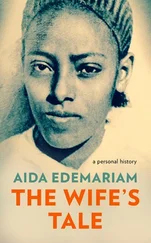Her father was proud, yes, but not too proud to beg. Over the years, from story after story – not all his – she had pieced together how she came to be. When Setechign – pale, beautiful, much-sought-after – first married Mekonnen the expected children did not arrive, so Tirunesh had taken herself off to church to have words with God about the situation. A boy was duly born, and named Nega, for the dawn.
Then Setechign left. No matter that Mekonnen was now a customs officer on the long lawless border with the Sudan. No matter that his immediate master was married to the empress’s sister. No matter that he regularly returned from military skirmishes laden with trophies and prisoners of war who often became valuable slaves, and that to this was added the tithes of the peasants who farmed his lands. Nor did it matter that – as Mekonnen, fond of genealogy (particularly his own) and possessed of a preternatural memory for names, made a point of reminding her – he could claim descent from at least three emperors and an empress, Taitu, and would thus give her offspring royal blood. No. His family was too big, there were too many hangers-on, it was all too much. So Setechign went.
He pleaded. He sent emissaries: his sister, his mother, elder after elder. They applied all the subtle pressures of home and hearth, and it took a couple of years, but eventually she returned, and they conceived a daughter.
In gratefulness Mekonnen plied his wife with gifts: trains of donkeys laden with wheat, barley, the whitest teff; pots of spiced butter, baskets of deep-red dried chillis, of cardamom, frankincense and rue.
Their daughter arrived the day before Christmas, on the feast of Ammanuel. There was no disagreement about what her baptismal name ought to be – Weletè Amanuel, daughter of Amanuel – but her daily name was another issue altogether. Her maternal grandmother favoured Genet, for the garden of Eden; her paternal grandmother Gedamenesh, or my sanctuary; while her mother called her Nigisté, my queen. Tirunesh and her father, however, chose Yetemegnu, or ‘those who believe’, and it was they who prevailed.
Again Setechign left. Distressed and in spiritual need she walked to Infiraz, where she had heard there was a great zar doctor. Perhaps he could heal her. But when she met him she was afraid. A huge, powerful man, he had once, when he was nineteen, crossed the high Simien on foot, scrambling down gorges and tramping over plains looking for his own mother, who had been abducted by a Tigréan lord. He found her, but could not release her, and on his way back had become possessed by a spirit that had never left him. He had learned instead to control it, and now his home was filled with incense and the smell of roasting coffee, with women speaking in tongues or stamping out their individual spirit dances; dancing, often, to his personal bidding too.
And this particular woman, with her tight-braided hair and neck so long it could take seven rings of tattoos – the zar doctor liked this particular woman. And the more Setechign fought him, the more she hated him, the more he liked her. She hated him so much that when she became pregnant with his child she tried to kill it, standing for hours under a waterfall in the hope of dislodging the growing thing. But it would not leave before it was ready and when it was born she called the boy ‘imbi alè’, or ‘he said no’. Not until he went away to school was his name changed, to Gebrè-Selassie.
Only Setechign’s third union, to a rich trader, gave her a measure of calm. The home she made with him was a place of dancing and honey wine, where an animal was slaughtered nearly every week, and parties included the neighbourhood poor, invited to eat their fill. Of warmth and love, where special meals were cooked for a shy daughter who basked in the unaccustomed glow of feeling singular, precious; who had gently to be encouraged to eat and was seldom allowed to stay. Yetemegnu made little protest, but every time she was taken away the grief curled deeper into her heart.
At her aunt’s there were fewer parties. Tirunesh was pious and severe, a disciplinarian who had little patience for a child who lost herself in games and dreams. But she made sure Yetemegnu learned to spin, and to cook. Every morning the child was required in the kitchen, to watch and to learn, and at last to try a few things herself – to feel the exact point at which it was best to add spices to onions and garlic turning gold in the pot; to judge just how thin to make the sourdough, so the injera would be delicate and light.
Their work was accompanied by a drone of words, but Yetemegnu never listened in any conscious way. Nor did she take much notice of the slight deacon who appeared after church each day, read from the homilies of Ruphael or of Mikael, then, having been fed, slipped away again, while the women turned to drinking coffee and pronouncing on the generally disappointing ways of the world.
Tirunesh had been watching the deacon, however. She questioned him about his education, his ambitions, and liked his considered answers. ‘If I had a daughter,’ she said to her husband one day, ‘I would marry her to this man.’
So when the deacon’s patron, a friend of hers, approached her with the news that the deacon was nearing the end of his training and looking for a wife, the suggestion that this wife be Yetemegnu fell on receptive ears.
‘He’s just another student from God knows where,’ said Mekonnen, disgusted. ‘Able, maybe, but so what? There are hundreds like him, cluttering up the churches. Absolutely not.’
‘He would be a good husband, perhaps the best she could have.’ To Mekonnen this was patently untrue. He could not believe his own sister could so easily squander their lineage on a nonentity; a nonentity, moreover, from Gojjam, an entirely different province, and thus foreign. ‘We don’t know anything about him. We don’t even know who his father is. No.’
‘Setechign,’ said Tirunesh on a visit one day, as gently as she knew how. ‘Isn’t it time your daughter was betrothed? The deacon who reads to me –’
‘She’s a child. She’s barely eight years old. I will not give my daughter to a man of thirty who has no women in his household, no mother in evidence, no nurse to care for her. How can you think of such a thing?’
Tirunesh turned to the elders. Deputations arrived at Mekonnen’s house, bearing blandishments, arguments, testimonies of character. Mekonnen listened, resisted all of them.
‘Look at me!’ cried his sister. ‘Look at me! I’m barren. Is that what you want for her? I’ll curse you for your cruelty!’
‘Now, now, no need –’
But she would not hear. ‘If you do not marry her to this man I will hate you forever. As Mary is my witness I will never visit your graveside. And you will never stand at mine.’
It was the strongest threat in the armoury, and her brother acceded with an angry sigh. ‘Very well. She can marry the student.’
His relenting made it harder for Setechign to hold fast. And different arguments were used with her. Of course the girl was young, but that was common and had its advantages: she could be moulded to her husband’s ways, she would grow up in an educated, pious house. It would be good for her. As for the lack of nurturing women, a nurse could be hired, servants, she could be given an experienced female slave.
No one told Yetemegnu what had been decided. Why would anyone bother to tell a girl child?
COME, O JEREMIAH, AND MAKE A LAMENTATION FOR MY MOTHER HANNA, FOR SHE HATH FORSAKEN ME, AND I AM ALONE IN THE HOUSE OF BRASS. WHO WILL POUR WATER ON MY HANDS? AND THE TEARS START IN MY EYES.
– LEGENDS
Before her husband left for Addis Ababa to petition for a parish, he had gone to see the governor of Gondar, to tell him of his marriage, and through his marriage, of his promotion both in Gondar society and from deacon to priest; to tell him that his wife was young and he a man who owned nothing. The governor had responded as the new priest hoped, awarding him a salary of twelve quintals of grain, teff and barley, a quintal of chillis, a generous measure of butter. Every month these things arrived on donkey-back and were received by her maternal grandmother, into whose care she had been returned. Here, too, they sometimes reminded her to put away childish things, but her life was really not so different from that of other children her age. She settled in quickly, helping around the house, visiting neighbours, family friends, sometimes forgetting, for hours at a time, that she could not stay. Now she really learned to dance, watching women at the weddings of her grandmother’s friends and relations, then slipping in among them and echoing every move. And when they saw how she loved it, how well and naturally it came to her, they circled her, and clapped and trilled and sang, encouraging her, laughing as she responded with tighter, more demanding movements, improving from day to day until she was nearly as good as some of the more accomplished adults.
Читать дальше












